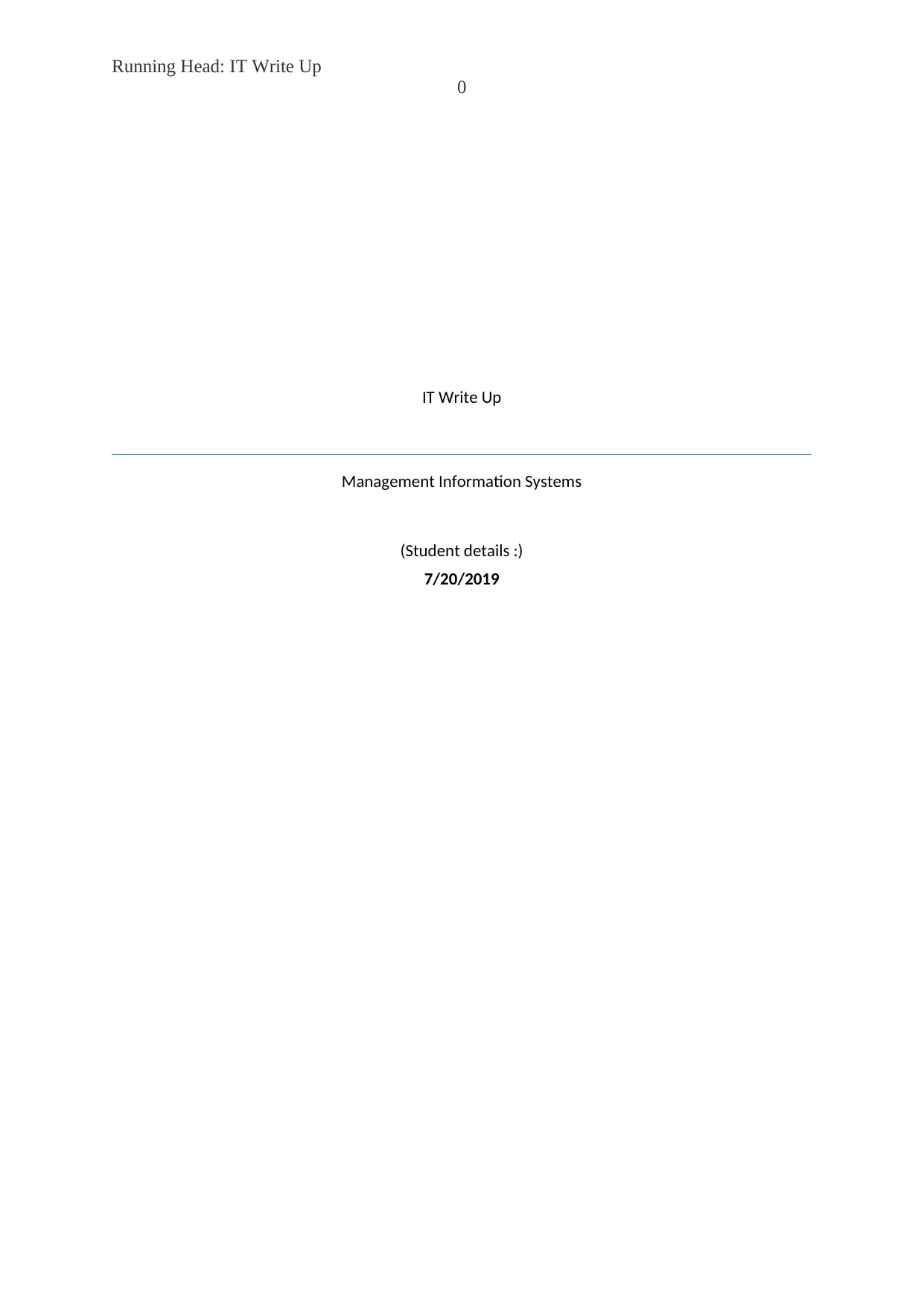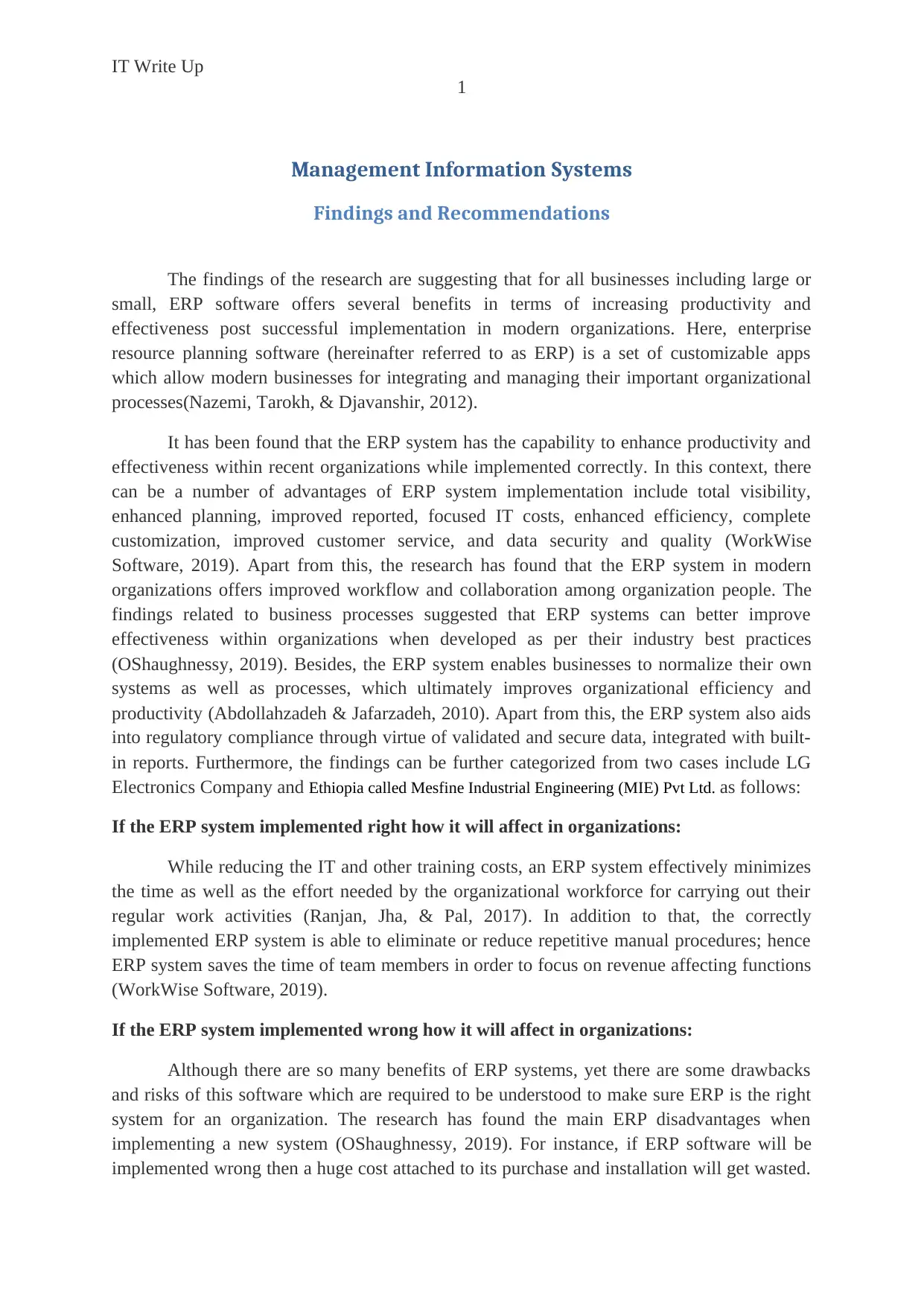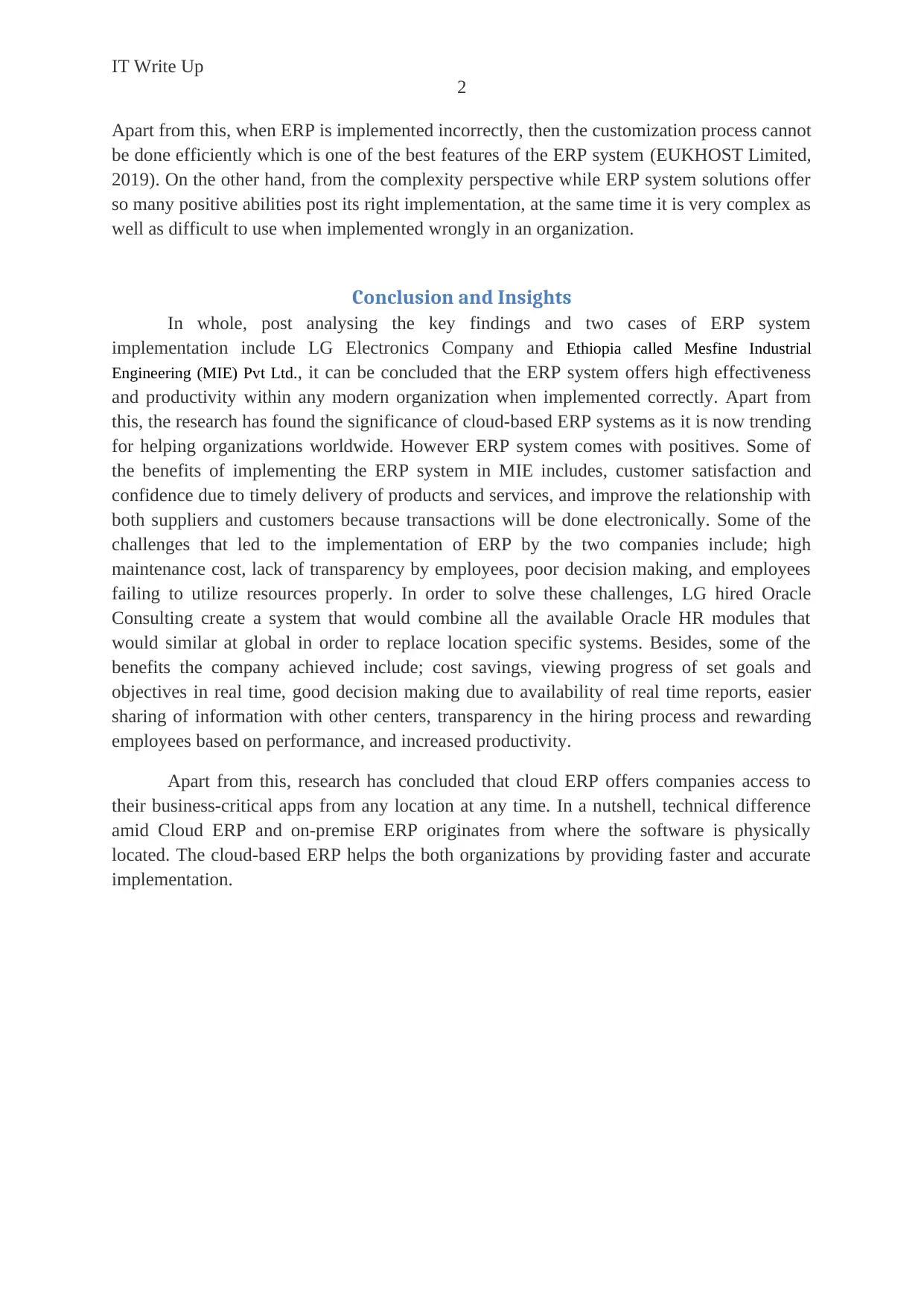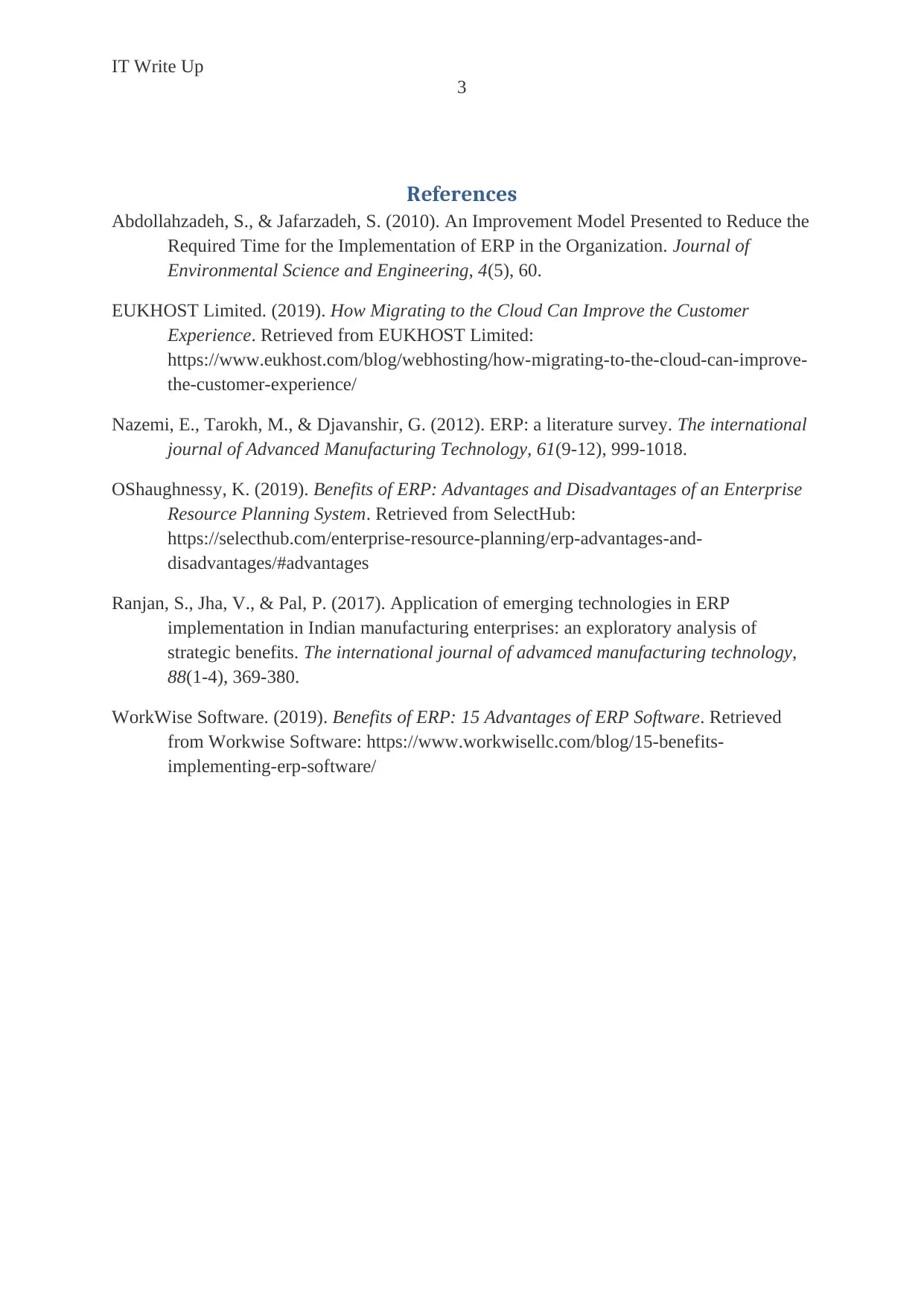IT Write Up: Management Information Systems Research Report
VerifiedAdded on 2022/11/16
|4
|1131
|170
Report
AI Summary
This IT write-up examines the implementation and impact of Enterprise Resource Planning (ERP) systems on modern organizations. The research highlights the benefits of ERP, including increased productivity, enhanced planning, improved reporting, and improved customer service. The report explores the advantages of ERP systems and also addresses potential drawbacks, such as high implementation costs and complexity. Two case studies, LG Electronics and Mesfine Industrial Engineering (MIE), are analyzed to illustrate the effects of proper and improper ERP implementation. The write-up also discusses the growing trend of cloud-based ERP systems and their advantages. The conclusion emphasizes the importance of correct ERP implementation for achieving organizational effectiveness and productivity, providing valuable insights for businesses considering ERP adoption.

Running Head: IT Write Up
0
IT Write Up
Management Information Systems
(Student details :)
7/20/2019
0
IT Write Up
Management Information Systems
(Student details :)
7/20/2019
Paraphrase This Document
Need a fresh take? Get an instant paraphrase of this document with our AI Paraphraser

IT Write Up
1
Management Information Systems
Findings and Recommendations
The findings of the research are suggesting that for all businesses including large or
small, ERP software offers several benefits in terms of increasing productivity and
effectiveness post successful implementation in modern organizations. Here, enterprise
resource planning software (hereinafter referred to as ERP) is a set of customizable apps
which allow modern businesses for integrating and managing their important organizational
processes(Nazemi, Tarokh, & Djavanshir, 2012).
It has been found that the ERP system has the capability to enhance productivity and
effectiveness within recent organizations while implemented correctly. In this context, there
can be a number of advantages of ERP system implementation include total visibility,
enhanced planning, improved reported, focused IT costs, enhanced efficiency, complete
customization, improved customer service, and data security and quality (WorkWise
Software, 2019). Apart from this, the research has found that the ERP system in modern
organizations offers improved workflow and collaboration among organization people. The
findings related to business processes suggested that ERP systems can better improve
effectiveness within organizations when developed as per their industry best practices
(OShaughnessy, 2019). Besides, the ERP system enables businesses to normalize their own
systems as well as processes, which ultimately improves organizational efficiency and
productivity (Abdollahzadeh & Jafarzadeh, 2010). Apart from this, the ERP system also aids
into regulatory compliance through virtue of validated and secure data, integrated with built-
in reports. Furthermore, the findings can be further categorized from two cases include LG
Electronics Company and Ethiopia called Mesfine Industrial Engineering (MIE) Pvt Ltd. as follows:
If the ERP system implemented right how it will affect in organizations:
While reducing the IT and other training costs, an ERP system effectively minimizes
the time as well as the effort needed by the organizational workforce for carrying out their
regular work activities (Ranjan, Jha, & Pal, 2017). In addition to that, the correctly
implemented ERP system is able to eliminate or reduce repetitive manual procedures; hence
ERP system saves the time of team members in order to focus on revenue affecting functions
(WorkWise Software, 2019).
If the ERP system implemented wrong how it will affect in organizations:
Although there are so many benefits of ERP systems, yet there are some drawbacks
and risks of this software which are required to be understood to make sure ERP is the right
system for an organization. The research has found the main ERP disadvantages when
implementing a new system (OShaughnessy, 2019). For instance, if ERP software will be
implemented wrong then a huge cost attached to its purchase and installation will get wasted.
1
Management Information Systems
Findings and Recommendations
The findings of the research are suggesting that for all businesses including large or
small, ERP software offers several benefits in terms of increasing productivity and
effectiveness post successful implementation in modern organizations. Here, enterprise
resource planning software (hereinafter referred to as ERP) is a set of customizable apps
which allow modern businesses for integrating and managing their important organizational
processes(Nazemi, Tarokh, & Djavanshir, 2012).
It has been found that the ERP system has the capability to enhance productivity and
effectiveness within recent organizations while implemented correctly. In this context, there
can be a number of advantages of ERP system implementation include total visibility,
enhanced planning, improved reported, focused IT costs, enhanced efficiency, complete
customization, improved customer service, and data security and quality (WorkWise
Software, 2019). Apart from this, the research has found that the ERP system in modern
organizations offers improved workflow and collaboration among organization people. The
findings related to business processes suggested that ERP systems can better improve
effectiveness within organizations when developed as per their industry best practices
(OShaughnessy, 2019). Besides, the ERP system enables businesses to normalize their own
systems as well as processes, which ultimately improves organizational efficiency and
productivity (Abdollahzadeh & Jafarzadeh, 2010). Apart from this, the ERP system also aids
into regulatory compliance through virtue of validated and secure data, integrated with built-
in reports. Furthermore, the findings can be further categorized from two cases include LG
Electronics Company and Ethiopia called Mesfine Industrial Engineering (MIE) Pvt Ltd. as follows:
If the ERP system implemented right how it will affect in organizations:
While reducing the IT and other training costs, an ERP system effectively minimizes
the time as well as the effort needed by the organizational workforce for carrying out their
regular work activities (Ranjan, Jha, & Pal, 2017). In addition to that, the correctly
implemented ERP system is able to eliminate or reduce repetitive manual procedures; hence
ERP system saves the time of team members in order to focus on revenue affecting functions
(WorkWise Software, 2019).
If the ERP system implemented wrong how it will affect in organizations:
Although there are so many benefits of ERP systems, yet there are some drawbacks
and risks of this software which are required to be understood to make sure ERP is the right
system for an organization. The research has found the main ERP disadvantages when
implementing a new system (OShaughnessy, 2019). For instance, if ERP software will be
implemented wrong then a huge cost attached to its purchase and installation will get wasted.

IT Write Up
2
Apart from this, when ERP is implemented incorrectly, then the customization process cannot
be done efficiently which is one of the best features of the ERP system (EUKHOST Limited,
2019). On the other hand, from the complexity perspective while ERP system solutions offer
so many positive abilities post its right implementation, at the same time it is very complex as
well as difficult to use when implemented wrongly in an organization.
Conclusion and Insights
In whole, post analysing the key findings and two cases of ERP system
implementation include LG Electronics Company and Ethiopia called Mesfine Industrial
Engineering (MIE) Pvt Ltd., it can be concluded that the ERP system offers high effectiveness
and productivity within any modern organization when implemented correctly. Apart from
this, the research has found the significance of cloud-based ERP systems as it is now trending
for helping organizations worldwide. However ERP system comes with positives. Some of
the benefits of implementing the ERP system in MIE includes, customer satisfaction and
confidence due to timely delivery of products and services, and improve the relationship with
both suppliers and customers because transactions will be done electronically. Some of the
challenges that led to the implementation of ERP by the two companies include; high
maintenance cost, lack of transparency by employees, poor decision making, and employees
failing to utilize resources properly. In order to solve these challenges, LG hired Oracle
Consulting create a system that would combine all the available Oracle HR modules that
would similar at global in order to replace location specific systems. Besides, some of the
benefits the company achieved include; cost savings, viewing progress of set goals and
objectives in real time, good decision making due to availability of real time reports, easier
sharing of information with other centers, transparency in the hiring process and rewarding
employees based on performance, and increased productivity.
Apart from this, research has concluded that cloud ERP offers companies access to
their business-critical apps from any location at any time. In a nutshell, technical difference
amid Cloud ERP and on-premise ERP originates from where the software is physically
located. The cloud-based ERP helps the both organizations by providing faster and accurate
implementation.
2
Apart from this, when ERP is implemented incorrectly, then the customization process cannot
be done efficiently which is one of the best features of the ERP system (EUKHOST Limited,
2019). On the other hand, from the complexity perspective while ERP system solutions offer
so many positive abilities post its right implementation, at the same time it is very complex as
well as difficult to use when implemented wrongly in an organization.
Conclusion and Insights
In whole, post analysing the key findings and two cases of ERP system
implementation include LG Electronics Company and Ethiopia called Mesfine Industrial
Engineering (MIE) Pvt Ltd., it can be concluded that the ERP system offers high effectiveness
and productivity within any modern organization when implemented correctly. Apart from
this, the research has found the significance of cloud-based ERP systems as it is now trending
for helping organizations worldwide. However ERP system comes with positives. Some of
the benefits of implementing the ERP system in MIE includes, customer satisfaction and
confidence due to timely delivery of products and services, and improve the relationship with
both suppliers and customers because transactions will be done electronically. Some of the
challenges that led to the implementation of ERP by the two companies include; high
maintenance cost, lack of transparency by employees, poor decision making, and employees
failing to utilize resources properly. In order to solve these challenges, LG hired Oracle
Consulting create a system that would combine all the available Oracle HR modules that
would similar at global in order to replace location specific systems. Besides, some of the
benefits the company achieved include; cost savings, viewing progress of set goals and
objectives in real time, good decision making due to availability of real time reports, easier
sharing of information with other centers, transparency in the hiring process and rewarding
employees based on performance, and increased productivity.
Apart from this, research has concluded that cloud ERP offers companies access to
their business-critical apps from any location at any time. In a nutshell, technical difference
amid Cloud ERP and on-premise ERP originates from where the software is physically
located. The cloud-based ERP helps the both organizations by providing faster and accurate
implementation.
⊘ This is a preview!⊘
Do you want full access?
Subscribe today to unlock all pages.

Trusted by 1+ million students worldwide

IT Write Up
3
References
Abdollahzadeh, S., & Jafarzadeh, S. (2010). An Improvement Model Presented to Reduce the
Required Time for the Implementation of ERP in the Organization. Journal of
Environmental Science and Engineering, 4(5), 60.
EUKHOST Limited. (2019). How Migrating to the Cloud Can Improve the Customer
Experience. Retrieved from EUKHOST Limited:
https://www.eukhost.com/blog/webhosting/how-migrating-to-the-cloud-can-improve-
the-customer-experience/
Nazemi, E., Tarokh, M., & Djavanshir, G. (2012). ERP: a literature survey. The international
journal of Advanced Manufacturing Technology, 61(9-12), 999-1018.
OShaughnessy, K. (2019). Benefits of ERP: Advantages and Disadvantages of an Enterprise
Resource Planning System. Retrieved from SelectHub:
https://selecthub.com/enterprise-resource-planning/erp-advantages-and-
disadvantages/#advantages
Ranjan, S., Jha, V., & Pal, P. (2017). Application of emerging technologies in ERP
implementation in Indian manufacturing enterprises: an exploratory analysis of
strategic benefits. The international journal of advamced manufacturing technology,
88(1-4), 369-380.
WorkWise Software. (2019). Benefits of ERP: 15 Advantages of ERP Software. Retrieved
from Workwise Software: https://www.workwisellc.com/blog/15-benefits-
implementing-erp-software/
3
References
Abdollahzadeh, S., & Jafarzadeh, S. (2010). An Improvement Model Presented to Reduce the
Required Time for the Implementation of ERP in the Organization. Journal of
Environmental Science and Engineering, 4(5), 60.
EUKHOST Limited. (2019). How Migrating to the Cloud Can Improve the Customer
Experience. Retrieved from EUKHOST Limited:
https://www.eukhost.com/blog/webhosting/how-migrating-to-the-cloud-can-improve-
the-customer-experience/
Nazemi, E., Tarokh, M., & Djavanshir, G. (2012). ERP: a literature survey. The international
journal of Advanced Manufacturing Technology, 61(9-12), 999-1018.
OShaughnessy, K. (2019). Benefits of ERP: Advantages and Disadvantages of an Enterprise
Resource Planning System. Retrieved from SelectHub:
https://selecthub.com/enterprise-resource-planning/erp-advantages-and-
disadvantages/#advantages
Ranjan, S., Jha, V., & Pal, P. (2017). Application of emerging technologies in ERP
implementation in Indian manufacturing enterprises: an exploratory analysis of
strategic benefits. The international journal of advamced manufacturing technology,
88(1-4), 369-380.
WorkWise Software. (2019). Benefits of ERP: 15 Advantages of ERP Software. Retrieved
from Workwise Software: https://www.workwisellc.com/blog/15-benefits-
implementing-erp-software/
1 out of 4
Related Documents
Your All-in-One AI-Powered Toolkit for Academic Success.
+13062052269
info@desklib.com
Available 24*7 on WhatsApp / Email
![[object Object]](/_next/static/media/star-bottom.7253800d.svg)
Unlock your academic potential
Copyright © 2020–2026 A2Z Services. All Rights Reserved. Developed and managed by ZUCOL.



